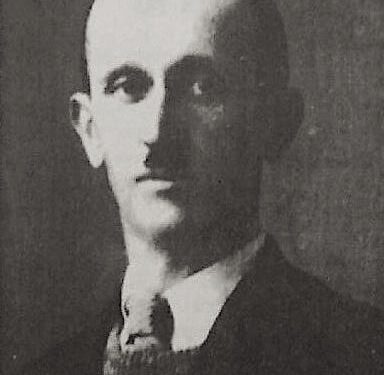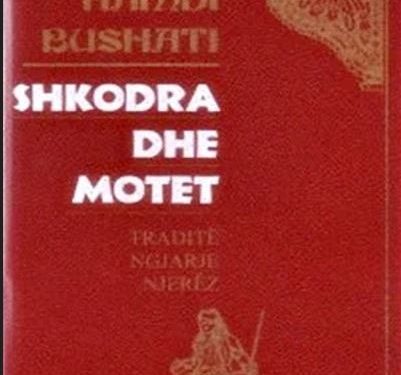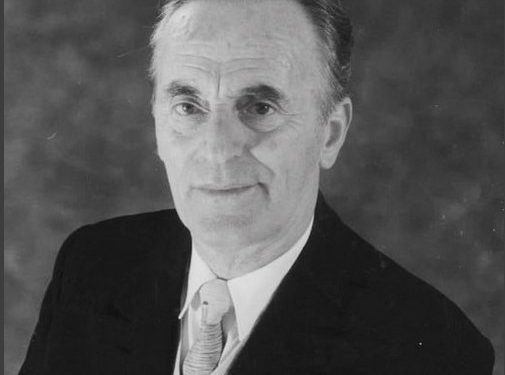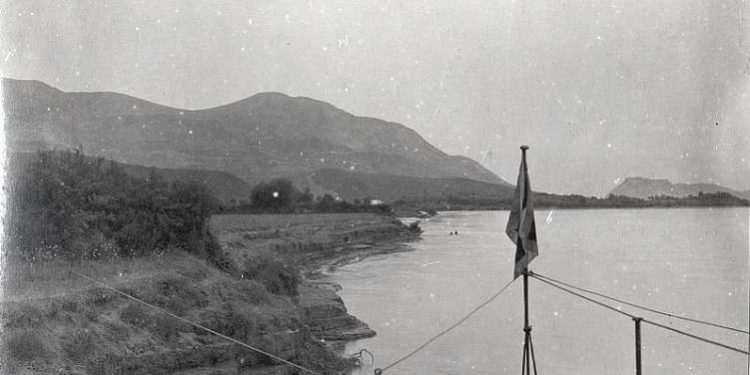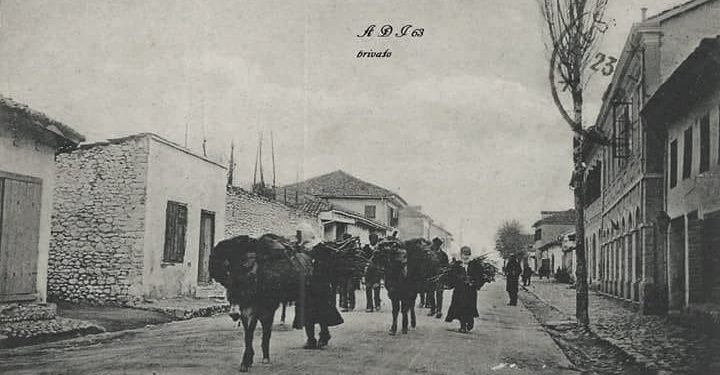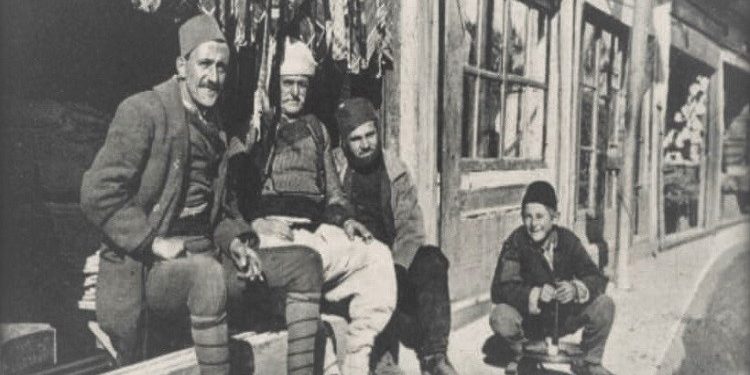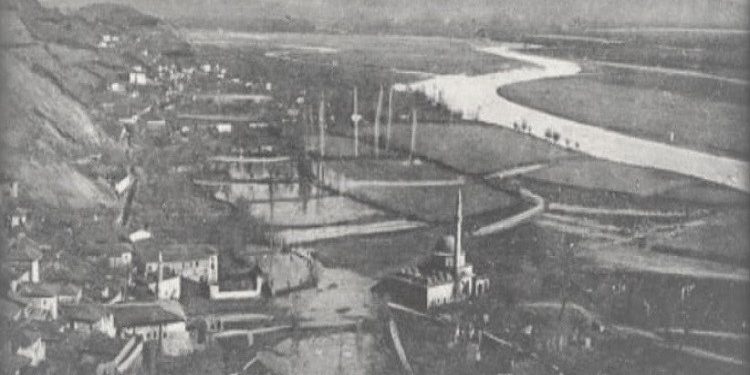– The book “Shkodra and weather”, by Hamdi Bushati, which also talks about the foreign origin of some Shkodra families –
Memorie.al / “Teacher of the people” Hamdi Bushati (1896-1983), who comes from one of the most respected and well-known families in Shkodra, has a lot of dedication, persistence and with scientific integrity and tireless work, he has consulted thousands documents and books as well as collected directly from the mouths of the people, the two-volume book of great historical value “SHKODRA AND WEATHER” – “TRADITIONS, EVENTS, PEOPLE” – was published (after his death) in Shkodra, in 1999 , with about 1200 pages and an annex of 120 pages, titled; “Genealogical view of Shkodra families”.
His son, the well-known teacher Mr. Nexhmi Hamdi Bushati, in “Two words for the publisher”, among other things, writes: “For the publication of this work, the employees of the Historical Museum of Shkodra and those of the Fototeka “Marubi”, headed by the director, Mr. Mentor Quku, who also engaged the late Vehbi Troshani, for the high-quality typing of this manuscript.
Likewise, Mr. Ali Kazazi and Visar Baia deserve gratitude, who managed to sensitize the lovers of cultural initiatives, enabling the sponsorship of the publication of this work. On this occasion, I feel it my duty to thank the gentlemen; Prof. Dr. Zija Shkodra, Faik Luli, Islam Dizdari and Menduh Dërguti, who with their professional preparation and their qualified suggestions, helped make this work as serious as possible”.
In the sixth chapter; “Families from Shkodra with foreign origins” (pages 283-312) of the second volume, the well-known Shkodra researcher Hamdi Bushati, writes as follows: “As is known historically, when Sultan Mehmet II conquered Shkodra, many Christian families they left the country and left the city. The houses left by Christians were given to Muslims.
From this it is well understood that those Muslims, to whom the houses of the fleeing Christians were handed over, were not all Albanians converted to Islam, during those years of occupation, they were Turks or, with other non-Albanian nationalities. Installations of Muslims of foreign origin continued to be confirmed until the recent times of the Ottoman occupation of Shkodra. Along with Muslims, Christians also came.
From the ethnographic and historical point of view, one must know the origin of the Albanianized families, both Muslim and Christian. Despite our tracing of these families, which exist today in Shkodër, others must have remained unmentioned, but we hope to discover them later. At the same time, this is a political-complex issue that deserves to be studied. In addition to the historical interest, this process also represents a social value, because it shows the psychology of Shkodran, its generosity and tolerance towards the “foreigners”.
It should be known that in Shkodër there are also extinct families, especially during the period of epidemic diseases, such as plague, cholera, etc., in the 18th and 19th centuries. By chance, we will also try to find out these families, as far as we can. For the origin of the families we are describing, we have no concrete documents, except for the traditional data of the members of those families themselves, who heard from their elders.
1) Immigrants from Turkey, Egypt, Arabia, Dardanelles, Morocco, Tunisia, Algeria, Syria, Dagestan, Sudan, etc.: Families from these countries make up the largest number of families immigrating to Shkodër. In this study, not all the families that came from these countries are mentioned, but only those families that are the most well-known, such as; the Raxhimi family (an imam from Egypt), the Djepaxhija family (a merchant from Konje in Anatolia), the Bërdicaj family (they came from Anatolia, right at the beginning of the Ottoman invasion and settled in the village of Bërdicë), the Dërguti family (from Vilajeti i Ajdini in Anatolia, to settle in the Dërgut neighborhood), Çukejt (artilleryman from Turkey), Çakejt (official personality from Çanak-Kalaja-Dardaneles), Kashejt (from Spain, after the overthrow of the Islamic dynasty),
See Muhamet Magribi (Imam from Morocco), Dilaveri (military from Turkey), Bilans (preparers of medicines, from the Bilan province of Anatolia), Kalajajt (janissary officer, coming from the early days of the Ottoman invasion), Abdurrahmans (Turkish officer , from Egypt), Rust (employee), Kalact family, Shehi family (shehler of Arab origin), Neli family, to Molla Dauti (Egyptian origin), Dizdart family (dizdar in kalà, coming from Iznik of Bruza in Anatolia) , the tribe of Sheh Qazim Hoxha, (soldier from the city of Kastamon in Anatolia),
Axhemi family (soldier from Trabzon in Asia Minor), Boksejt family (soldier from Anatolia), Muhamet Shehu family, (hoxha from Asia Minor), Jenishehri family (from Hudaveqindar vilayet city of Ortugal sanjak), Hysejt family, (officer from Izmir in Anatolia), the Xhemil Tulejmani family, (a textile artist from the city of Humus, in Syria), the Mejidi family, (originating from Degistan), the Behrej family, (soldiers since the beginning of the Ottoman occupation), the Allajbegve family, (colonel of Turkish origin), the Hadrejt family, (mytevli-custodial administrator), the Sala-Isuft family, (Greek and Muslim parents).
– The Albanianized blacks (nicknamed “Harapet”) in Shkodër, who form a small number, are generally of Egyptian Sudanese origin. They were brought as slaves by merchants, especially by sailors from Ulcinj. These were bought among the markets of Algeria, Tunisia, Syria, etc…! These are mentioned especially near the Bushatllij viziers…! Catholic and Orthodox families have never kept a harp or harp…! These served only among bourgeois and aristocratic Muslim families, who treated them as family members of the house where they lived.
2) Families from Armenia, Greece, Austria, Italy:
from Armenia: expelled by the Turks, from Mustafa Qemal Ataturk, such as the Johanexhan family, (cattle casings worker), the Hagopi family, (silk technician and processor), the Muzali family, (doctor) from Greece: the Kacarosi family, (tobacco warehouse worker) , the Ronkali family, (tailors), the Idromeno family, (architect and painter).
They came from Austria, Vienna: the Ingriz family, (shoemaker and one of the first trade unionists in Shkodër), from Italy: the Scanietti family (artist), the Zamputti family, (doctor), the Tedeschini family, (doctor since 1760), the Benussi family, (pharmacist). Valuable historical information is also provided about these families. Their number is not significant.
3) Podgorica, coming from Montenegro: Podgorica immigrants flocked to Shkodra, in four periods: 1). during the reign of the Bushatlins, 2). After the Congress of Berlin, 3). During World War I, 4). During World War II”. The Podgoricas are Muslim Slavic families from Podgorica, such as; Shpuza, Nikshiqi, or in general from Montenegro. The earliest Podgorica families, especially those of the first wave, consider themselves Albanian and many of them have Albanianized their names, removing the Slavic suffix; “go away”.
The earliest and most mentioned family in this study is the Alivoda (Alivodovic) family, from which the Podgorica family derives today, the Bajri family, which was once called Muxhiq, the Mandia (Mandiq) family, the Osmani (Osmanagiq) family, the Haveri ( Haveriq), Uruçi family (Uruçeviq), Bebeziq family, Sykaj family (Sykniq), Juka (Jukniq), Llukaqi (Llukaqeviq), Halluni (Hallunovic), Striniq family, Boshnjaku family, from Bosnia, etc.
4) Those that came from the Albanian lands, Ulqini, Tuzi, Kraja: There was an emigration of Albanians to Shkodër, also from the Albanian lands in Montenegro, such as Ulqini, Tuzi, Kraja. I must say that the emigration of the people of Podgorica, the people of Ulcinj, etc., has given rise to the change of some traditional Shkodra customs”.
At the end of the second half. evaluation statements of this work are given by: Prof. Dr. Jup Kastrati, Prof. Dr. Happy Shpuza. which he calls “Albanological Encyclopedia for Shkodra and the Shkodraans”, As. Prof. Dr. Artan Haxhi, As. Prof. Dr. Simon Pepa, Islam Dizdari, Rector of “Luigj Gurakuqi” University of Shkodra. Nor. Prof. Dr. Mahir Hoti, Mentor Kopliku, the famous writer Fadil Kraja, Nikolla Spathari, Ahmet Osja, Artes Llazani as well as Nexhmi Hamdi Bushati.
The book of the well-known researcher, Hamdi Bushati, has had a considerable echo in the Albanian press, such as: “Gazeta Shqiptare”, dated 11.10.1998, “Democratic Revival”, dated 20.10.1998, “Rimkambja” dated 20.10.1998, “Islamic Light”, October 1998, “Albania”, on 21.10.1998, “Drita e Dijes”, in September and October 1998, “Perla”, in no. 4 1998, “Klan” magazine, in no. 84 1998, etc. Memorie.al




